Russian state television DEFIES President Putin's propaganda edict and broadcasts criticism of the war in Ukraine - with guests describing the shambolic invasion as 'like Afghanistan, but even WORSE'
- Putin’s war on freedom of expression in Russia appeared to be fraying at the edges on Thursday
- Guests on Kremlin-backed television defied Moscow and openly criticised the ongoing war in Ukraine
- Some said the invasion was worse than the Afghanistan operation in the 1980s which ended in failure
- Putin has intensified a crackdown on media and individuals who fail to hew to the Kremlin line on the war
PUBLISHED: 11:24 AEDT, 11 March 2022 | UPDATED: 12:40 AEDT, 11 March 2022
Putin’s war on freedom of expression in Russia appeared to be fraying at the edges on Thursday after guests on Kremlin-backed TV defied Moscow and openly criticised the brutal conflict in Ukraine, calling the invasion ‘even worse than Afghanistan’.
Guests have refused to support the narrative pushed through by television hosts on Putin’s request that Russia has been conducting a ‘special operation’ to ‘demilitarise’ and ‘de-Nazify’ Ukraine – claims dismissed as baseless pretexts by Kyiv and her partners in the West.
One who appeared on one of Russia 1’s prime time talk show rebelled by referring to the USSR’s disastrous invasion of Afghanistan in 1979 which ended in withdrawal ten years later.
Historians argue that Moscow’s failure in that war, in which thousands of Red Army troops were killed, fuelled disillusionment among millions of people in the Soviet Union and ultimately helped to bring about the collapse of the ‘Evil Empire’ in 1991.
Putin’s ‘propagandist-in-chief’ Vladimir Soloviev, who has been sanctioned by the EU, was forced to interrupt Semyond Bagdasarov after the academic told him: ‘Do we need to get into another Afghanistan, but even worse?’. He said that in Ukraine ‘there are more people and they’re more advanced in their weapon handling’, before adding: ‘We don’t need that. Enough already.’
Speaking during a broadcast on Russia 1 earlier, Karen Shakhnazarov, a filmmaker and state pundit, said the conflict in Ukraine risked isolating Russia.
He told Mr Soloviyev: ‘I have a hard time imagining taking cities such as Kyiv. I can’t imagine how that would look.’ The filmmaker went on to demand an end to the war, declaring: ‘If this picture starts to transform into an absolute humanitarian disaster, even our close allies like China and India will be forced to distance themselves from us.
‘This public opinion, with which they’re saturating the entire world, can play out badly for us... Ending this operation will stabilise things within the country.’

A destroyed Russian tank is seen after battles on a main road near Brovary, north of Kyiv, March 10, 2022
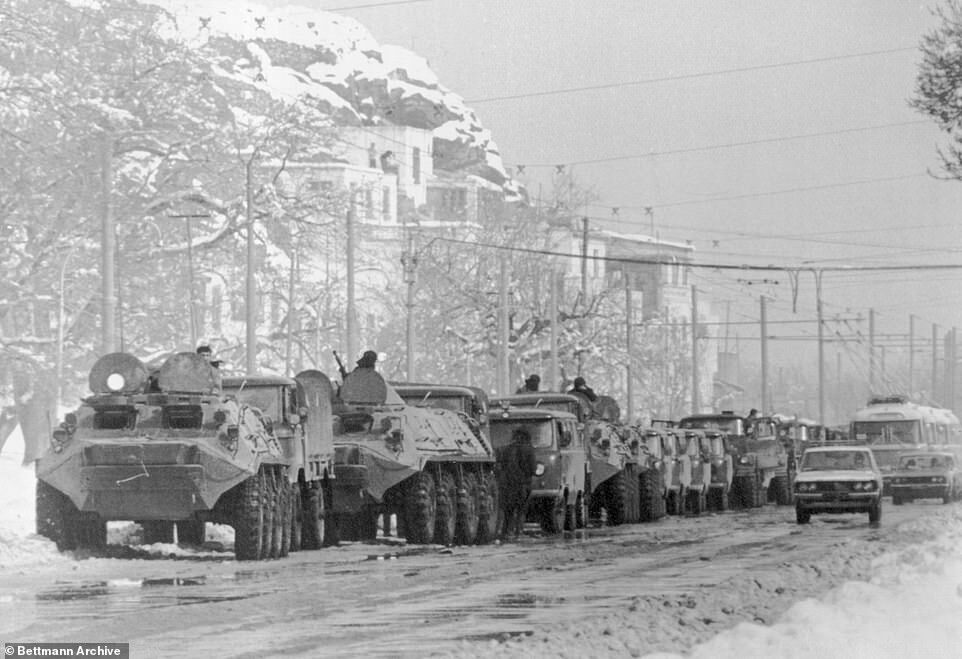
Guests on Russian state television have called the Ukraine war 'even worse than Afghanistan' in the 1980s
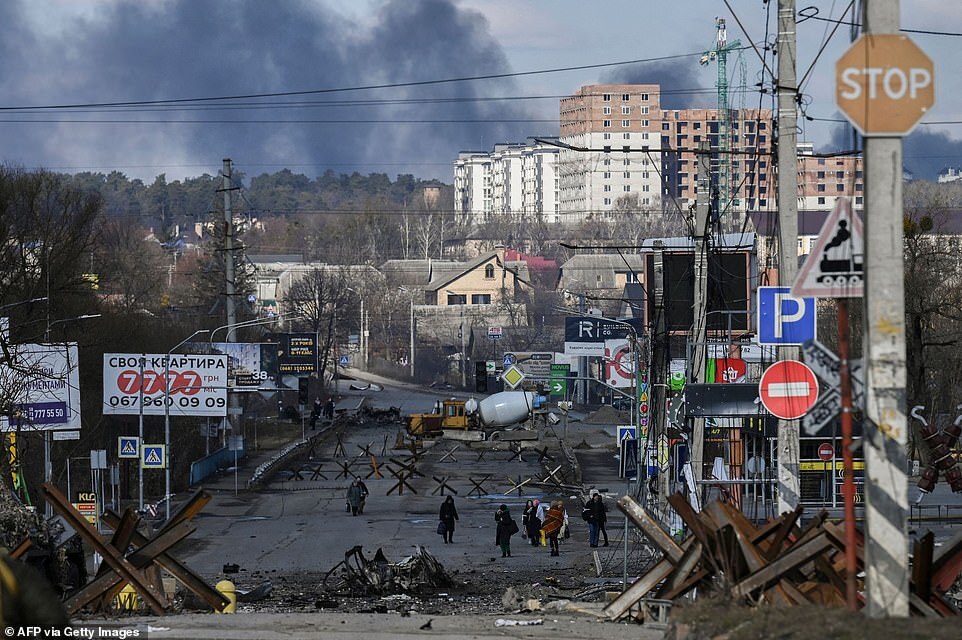
Residents evacuate the city of Irpin, north of Kyiv, on March 10, 2022
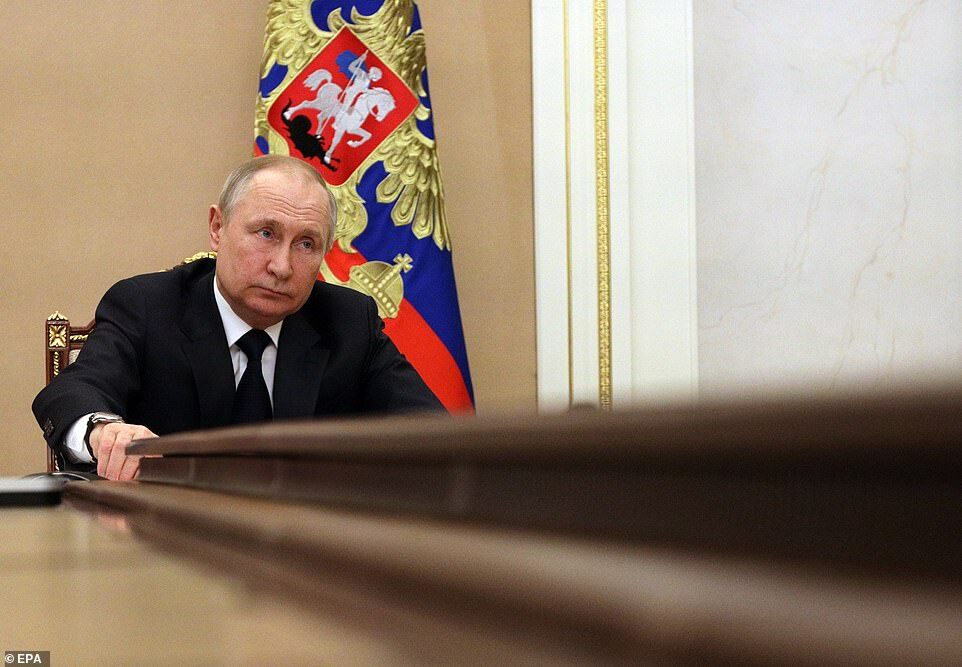
Putin attends a videoconference meeting with Government members at the Kremlin in Moscow, Russia, March 10, 2022

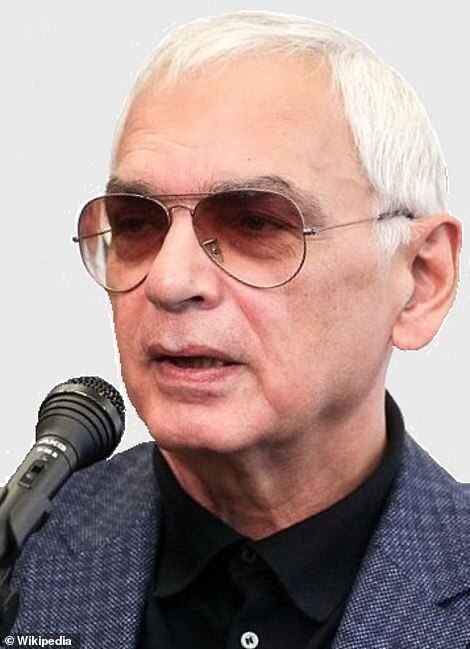
Left, Semyond Bagdasarov. Right, Karen Shakhnazarov. Both appeared on Kremlin-backed TV and criticised the war
Putin has intensified a crackdown on media outlets and individuals who fail to hew to the Kremlin line on the war, blocking Facebook and Twitter and signing into law a bill that criminalises the intentional spreading of so-called ‘fake news’ in Russia.
Russians who criticise the war face being jailed for 15 years, while independent media in the country face threats of closure or large fines if they refer to the military campaign as an ‘invasion’.
The information war escalated on Thursday, with Moscow shifting its stance over the bombing of a hospital in the city of Mariupol with a mix of statements on Thursday that veered between aggressive denials and a call by the Kremlin to establish clear facts.
Volodymyr Zelensky said three people including a child had been killed in the bombing on Wednesday, and rejected Russian assertions there had been no patients there.
‘Like always, they lie confidently,’ said Zelensky, who has accused Moscow of waging genocide in the war it launched two weeks ago.
In the face of worldwide condemnation there were rare signs of inconsistency in the response from Russian officials, who since the start of Moscow’s invasion on February 24 have stuck tightly to the same narrative for what Russia calls its special military operation in Ukraine.
Kremlin spokesman Dmitry Peskov, asked for comment in the immediate aftermath, told Reuters on Wednesday: ‘Russian forces do not fire on civilian targets.’ On Thursday he said the Kremlin would look into the incident.
Other Russian officials took a more aggressive line, rejecting the hospital bombing as fake news. ‘This is information terrorism,’ foreign ministry spokeswoman Maria Zakharova said.
The Defence Ministry later denied having bombed the hospital, accusing Ukraine of staging the incident. It said Russian forces at the time had been respecting an agreement to hold fire to allow the evacuation of civilians.
‘Russian aviation carried out absolutely no strikes on ground targets in the area,’ spokesman Igor Konashenkov said. ‘The alleged air strike was completely a staged provocation... that can deceive the Western public but not an expert.’
Foreign Minister Sergei Lavrov attacked what he called ‘pathetic shouting about so-called atrocities by the Russian armed forces’.
He told reporters after meeting Ukraine’s foreign minister in Turkey that the hospital building had for days been under the control of ultra-radical Ukrainian forces who had emptied out the doctors and patients – the version rejected by Zelensky as a lie.
On Wednesday, the United States denied renewed Russian accusations that Washington was operating biowarfare labs in Ukraine, calling the claims ‘laughable’.
During a televised meeting with Kremlin officials on Thursday, Putin addressed the Western sanctions that have caused the ruble to crash and led many major companies to leave Russia.
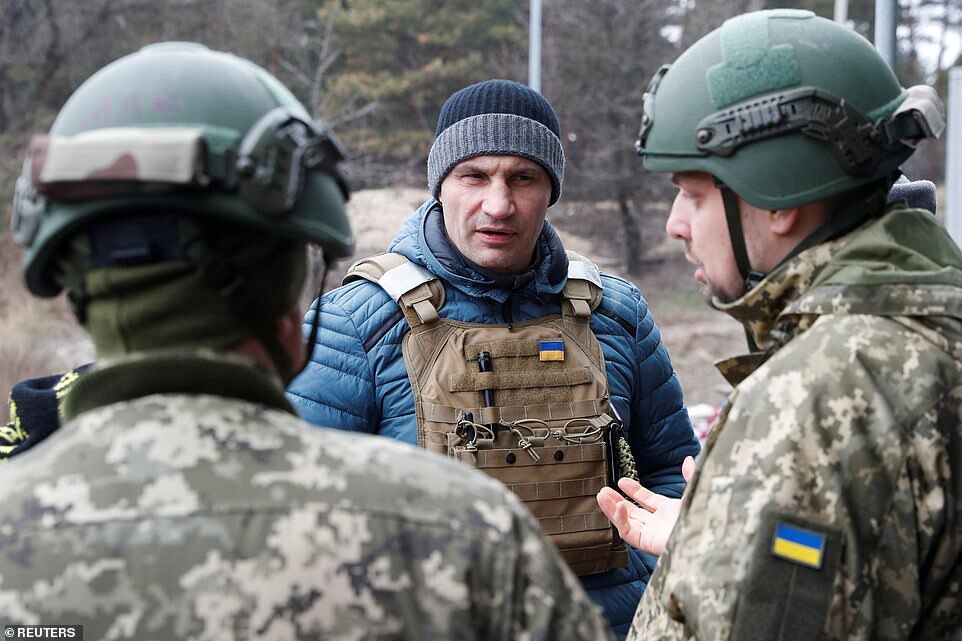
Kyiv mayor Vitali Klitschko said today that Ukraine's capital city has been 'turned into a fortress' ahead of the Russian assault, with about 2 million people - half the residents of the metro area of the capital - having fled as Putin's troops draw ever closer
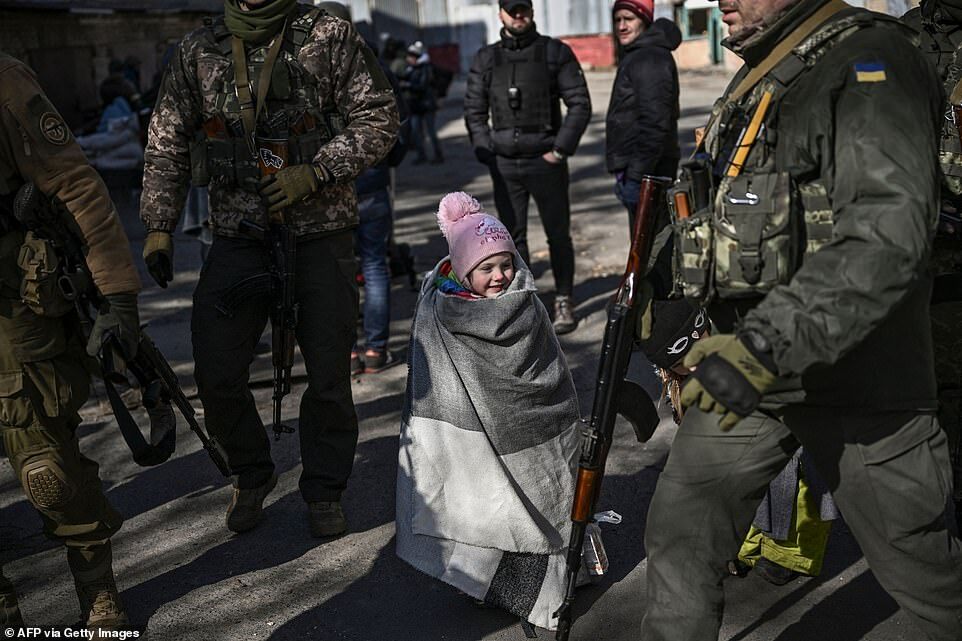
A child wait to be evacuated from the city of Irpin, north of Kyiv, on March 10, 202
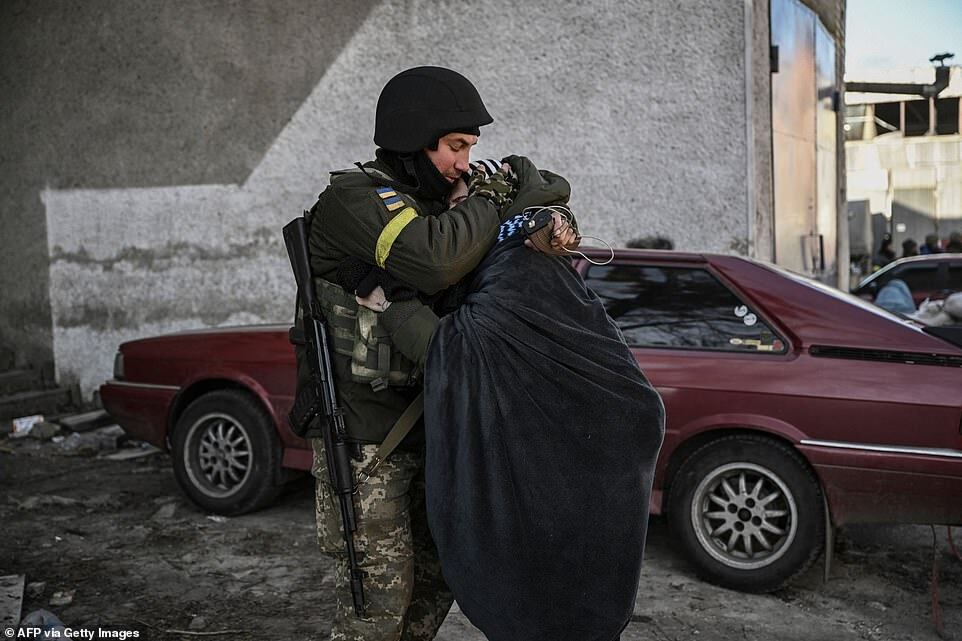
Kyiv's northwest suburbs such as Irpin and Bucha have been enduring shellfire and bombardments for more than a week, prompting a mass evacuation effort (Ukrainian soldier hugs his wife evacuating Irpin, north of Kyiv)

A Russian armoured vehicle sits by the side of the road in Brovary, to the east of Kyiv, after being destroyed in an artillery and rocket ambush that caused heavy casualties
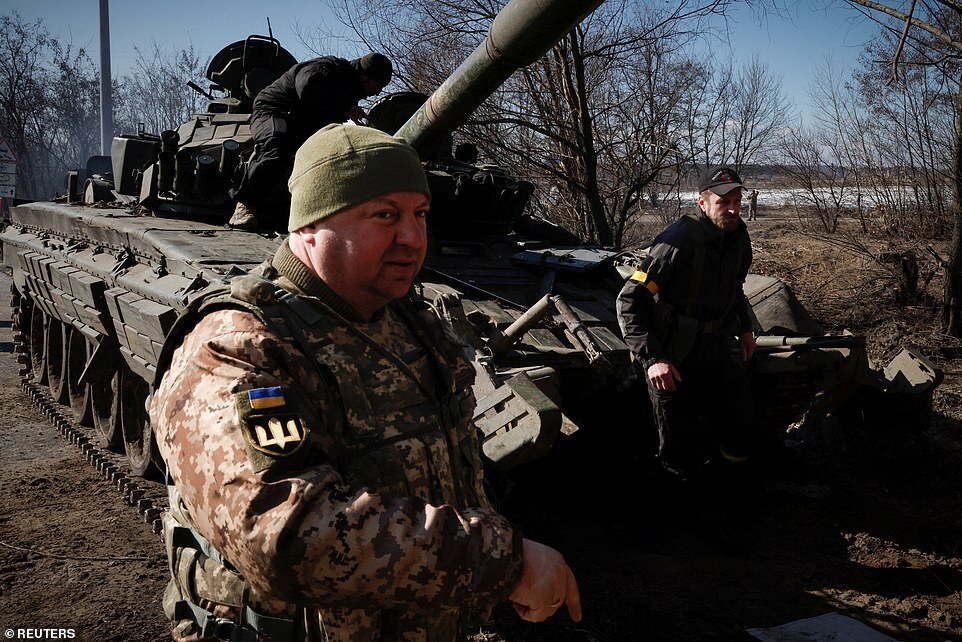
Ukrainian servicemen walk in front of a Russian tank that they captured after fighting, as Russia's attack on Ukraine continues, outside Brovary near Kyiv, Ukraine, March 10, 2022

Ukrainian servicemen drive off in a Russian tank they captured after fighting with Russian troops, as Russia's attack on Ukraine continues, outside Brovary, near Kyiv, Ukraine, March 10, 2022
‘The pressure of sanctions has always been there. Yes, of course, now it is complex and creates certain challenges, problems, difficulties for us. But just as we overcame these difficulties in the previous years, we will overcome them now. We must go through this period. The economy will certainly adapt to the new situation’, the Russian despot said.
The list of companies that have stopped operating in Russia grew Thursday, with German fashion brand Hugo Boss temporarily closing its stores and US-based hotel chains Hilton and Marriott closing their Moscow offices, though their Russian hotels are owned and operated by franchisees and will stay open.
The Walt Disney Company said that in addition to pausing film releases in Russia, as previously announced, it was also ‘taking steps to pause all other businesses’ there.
Goldman Sachs said it would close its operations in Russia entirely, making it the first major Wall Street bank to do so since Russia invaded Ukraine.
And JPMorgan Chase said it was ‘unwinding’ its Russian banking business.
Meanwhile, Twitter launched a privacy-protected version of its site to bypass surveillance and censorship after Russia restricted access to its service in the country.
Share or comment on this article:
Ukraine war: Guests on Russian state TV describe the invasion as like 'Afghanistan, but even worse'
'The Citing Articles' 카테고리의 다른 글
| 민주당 "새 원내대표, 교황 뽑듯 뽑겠다···입후보 안받는다" (0) | 2022.03.11 |
|---|---|
| “윤석열 왜 뽑았어요?” 물었더니… 39%가 이렇게 대답했다 (0) | 2022.03.11 |
| Zelensky warns the threat of Russia deploying chemical weapons is 'very real' (0) | 2022.03.11 |
| 마지막 날 '727km' 유세 윤석열이 밝힌 소감...쉰 목소리로 "파이팅" (0) | 2022.03.11 |
| 尹당선인 “한중관계 발전 확신” 시진핑 “우호협력 심화” 축전 (0) | 2022.03.11 |